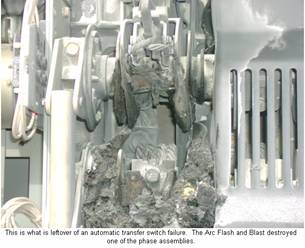OSHA & 70E – Part 4 of 4
By Mel Amundson
 This article is the 4th in a series of four (4) where I will try to provide a framework for your understanding of how “NFPA 70E and Arc Flash Safety” are affecting our workplace today, and into the future. To view prior articles click on Part 1 or Part 2 or Part 3.
This article is the 4th in a series of four (4) where I will try to provide a framework for your understanding of how “NFPA 70E and Arc Flash Safety” are affecting our workplace today, and into the future. To view prior articles click on Part 1 or Part 2 or Part 3.
4. Who is pushing 70E in your door?
a. Where is OSHA? Why hasn’t NFPA 70E Article 130 been adopted into OSHA regulations?
OSHA has not “adopted” NFPA 70E simply because adoption would require the lengthy and expensive process outlined in Section 6(b) of the Act. OSHA has instead referenced compliance to NFPA 70E using Section 5(a) (1) of the Occupational Safety and Health Act of 1970, commonly referred to as the “general duty clause,” as their basis for implementation. The general duty clause states that employers “shall furnish to each of its employees employment and a place of employment which are free from recognized hazards that are causing or likely to cause death or serious physical harm to his employees.”
This methodology for “implementing” potentially new requirements through the use of industrial consensus standards, like NFPA 70E, is common practice by OSHA. In a recent standard interpretation letter dated 7/25/03, OSHA’s Russell Swanson stated: “Industry consensus standards, such as NFPA 70E, can be used by employers as guides to making the assessments and equipment selections required by the standard. Similarly, in OSHA enforcement actions, they can be used as evidence of whether the employer acted reasonably.
It is clear from the above evidence that OSHA is using NFPA 70E as an industrial consensus standard. Further, OSHA expects employers and employees to comply with the provisions of NFPA 70E regardless of whether or not it has been “adopted” as an OSHA requirement.
b. State and local adoption.
Virginia Occupational Safety and Health (VOSH) is already referencing NFPA 70E® 2004 edition and is currently reviewing the new updates in the 2009 version. As Virginia has a state run program, VOSH has the option for a review period and that is why Virginia is not already enforcing NFPA 70E® 2009 edition. Federal OSHA has already adopted the newer updates and it is likely only a matter of time before VOSH follows suit.
c. Summary
In summary, OSHA expects employers and employees to comply with the provisions of NFPA 70E regardless of whether or not it has been “adopted” as an OSHA requirement.
NFPA 70E compliance for a company involves putting an electrical safety program in place, which will identify and analyze electrical hazards in the workplace, educate the workforce on those hazards, require the use of appropriate PPE, and implement warning labels and guards to protect the workers.
An employer that fails to implement NFPA 70E could have a hard time proving that it exercised due diligence after an electrical accident if adherence to NFPA 70E standards would have prevented the accident.
Mel Amundson, President of Amstar Electric, is a noted presentor and consultant in the electrical industry. http://www.mbamundson.com/